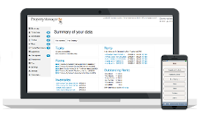Landlords have a legal duty of care that the electrics in their buy-to-let properties are safe. The Electrical Safety Council has produced a list of top tips for landlords to keep their properties safe:
Landlords are responsible for making sure the electrical installation is safe in a property
This responsibility applies at the start of a tenancy and the property must be maintained in a safe condition throughout its duration. Landlords should carry out basic visual checks to ensure that the installation has no hazards, including broken accessories (such as sockets and light switches), signs of scorching around sockets due to overloading, damaged cables to portable equipment or trailing cables/flexes.
Have a regular periodic inspection and test carried out on the property
If you own a House in Multiple Occupation (HMO), a landlord has a legal obligation to have a periodic inspection carried out on your property every five years. If your property is not an HMO, you are not legally obliged to get your installation inspected and tested on a periodic basis. However, the ESC recommends that a periodic inspection and test is carried out by a registered electrician on your rental properties at intervals not exceeding five years, or on a change of tenancy. They will then issue an Electrical Installation Condition Report (EICR) which details any damage, deterioration, defects or conditions within the installation that give rise, or potentially give rise, to danger.
Make sure that your property has adequate RCD protection
Since 2008 the UK standard for the safety of electrical installations, BS 7671, has called for almost all electrical circuits installed in homes to be RCD protected. An RCD is a life-saving device which protects against dangerous electric shock and reduces the risk of electrical fires.
Use a registered electrician for any work on your property
By choosing a registered electrician, a landlord will have the peace of mind that comes with knowing the work is being done to the UK National Standard, BS 7671.
Carry out Portable Appliance Testing (PAT) on appliances provided as part of the rental agreement
As a landlord you are required to take reasonable steps to ensure that the appliances you provide are safe. Portable Appliance Testing is one way of doing this and it should be carried out before every new tenancy.
Download the ESC's 'Home Electrical Safety Check' smartphone app
Their new smartphone app makes it easy for you to carry out a fast and effective review of your properties and fulfil your responsibility for tenant safety. Visit the Android Market or App Store and search for ‘Home Electrical Safety Check’.
To download the full electrical safety manual follow the link.
Landlord insurance - expert brokers - internet rates
Subscribe to:
Post Comments (Atom)








No comments:
Post a Comment